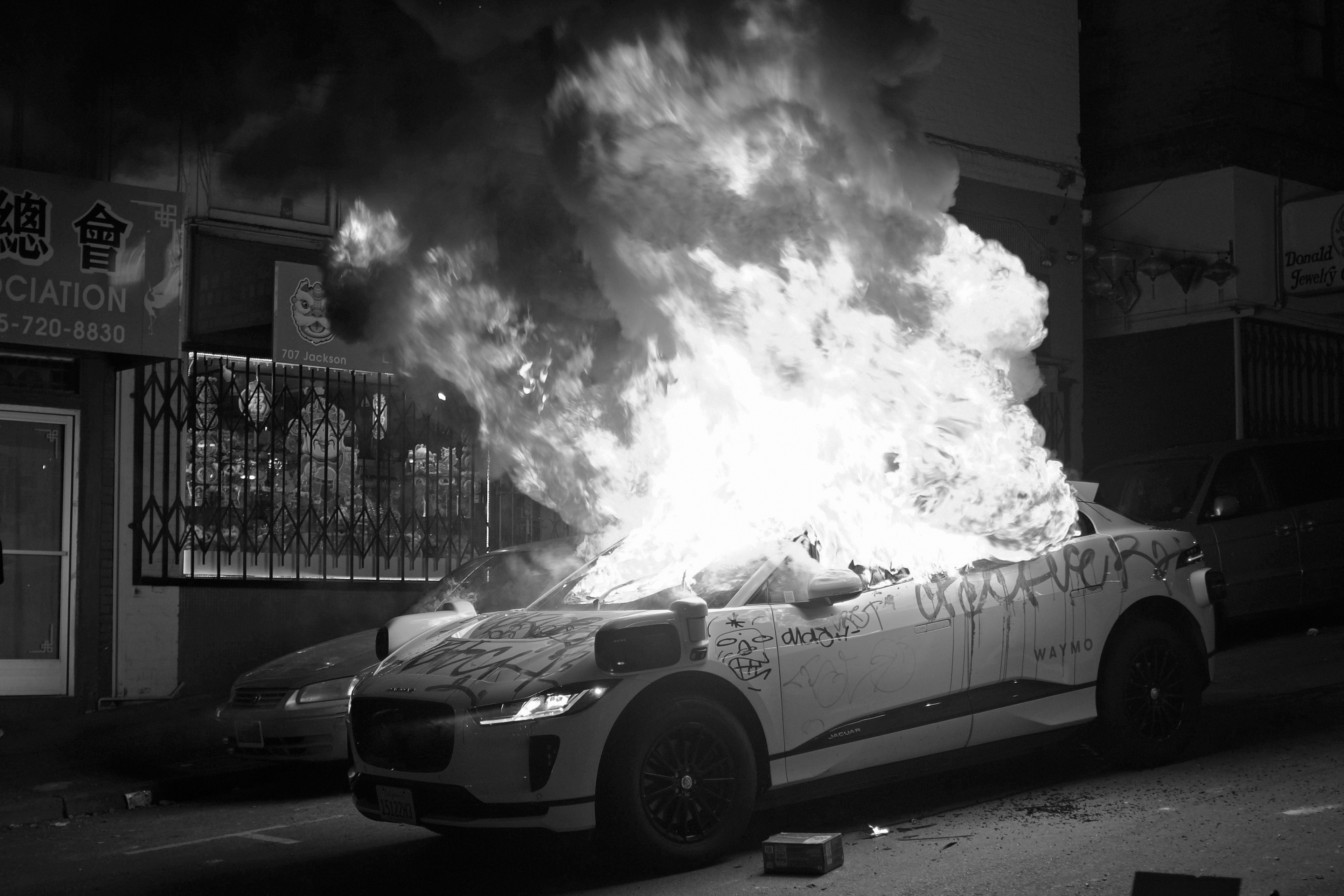In the wake of the recent arson attack on a Waymo self-driving vehicle in Chinatown, The Standard asked four major mayoral candidates to share their responses to the violence. Mayor London Breed and nonprofit founder Daniel Lurie both agreed to participate; former Supervisor Mark Farrell declined; Supervisor Ahsha Safaí did not respond. Read Mayor London Breed’s response.
Last Saturday, a group set an autonomous vehicle ablaze in front of scores of onlookers. The message was clear: People don’t fear consequences in San Francisco.
As a candidate for mayor, I want you to know your safety is my top priority. And it starts with accountability. The people who burned that Waymo, creating a dangerous situation for Chinatown residents, must be held accountable. And so should the system at City Hall that has allowed these issues to fester for years.
As San Franciscans, we have a lot to be proud of. But we can’t deny that the situation on our streets has gotten out of control. I hear that over and over from the residents I meet on the campaign trail and even from my own children. And I see it with my own eyes.
As the only candidate running from outside the system, I am unencumbered by the political machinery that has allowed our problems to continue. Instead, I bring a proven record of getting big things done as the leader of a successful anti-poverty organization that never took a cent of government money. Relying on the same ideas and leadership won’t get us different results. Other candidates have resorted to traditional tough talk, excuses or soundbites to distract from the fact that they already had the chance to build the foundation needed for a safe San Francisco and squandered it. My opponents are thinking small when we need fundamental change.
Criminals need to know they’re going to get caught
If we want to stop criminals like those who burned the Waymo, they must believe they will get caught and face consequences. The certainty of being caught is a vastly more powerful deterrent than any punishment, and the city’s rates of arrest for property crimes remain exceedingly low.
More than half of all property crimes in San Francisco are auto burglaries, a crime known to be committed overwhelmingly by organized criminal elements. Regrettably, these individuals know that the likelihood that they’re going to get arrested is low, with police arresting auto burglars in approximately 1.5% of reported incidents. Studies suggest that only a third of property crimes are reported, so you can do the math on the perception criminals have about being caught.
I do not fault law enforcement for low arrest rates. We’ve seen an exodus from our law enforcement agencies, which has left the San Francisco Police Department and San Francisco Sheriff’s Office dangerously short-staffed.
While some politicians are talking about who they will fire at SFPD, I’m focused on hiring. In order to up our arrest rate, we need more police walking the beat, deterring crime and patrolling in vehicles to respond quickly and expedite 911 response times.
With incentives and aggressive recruitment and retention strategies, we can begin the long-term work of fully staffing our law enforcement agencies. Traditional signing bonuses have proven insufficient. We have to build workforce housing for first responders and offer rent subsidies so officers can live in the communities where they work. That will not only help build back our ranks, it will help build trust. We also need diversity in our ranks so our officers look like the communities they serve. And if we want modern law enforcement agencies, we have to offer modern incentives like child care.
Increasing the effectiveness of our law enforcement requires us to change existing strategies that waste valuable resources. Not every contact requires a response from someone with a badge and gun. I will expand teams of non-police first responders to get those in crisis and engaging in low-level criminal behavior into treatment and off the street, freeing police resources and expediting 911 response times.
We must also responsibly leverage technology as we work to rebuild our law enforcement agencies. Community safety cameras can deter crime and hold repeat offenders accountable by enabling law enforcement to build bigger cases. We know this works. Just look at Union Square, where a network of private cameras helped SFPD bust high-profile theft rings. My plan to use geolocation technology to keep first-time drug offenders out of the Tenderloin is backed by experts.
Since 2005, the nonprofit I founded, Tipping Point Community, has helped over 1 million people. We housed over 38,000 people, in addition to those we prevented from becoming homeless. We facilitated the building of a tiny home village on Gough Street for $34,000 per unit—compared with the $113,000 per unit the city is currently paying. We also delivered affordable housing at 833 Bryant St. on time and under budget with good-paying union labor.
We made meaningful progress on the biggest problems facing San Francisco, and we didn’t do it by putting our fingers up to see which way the political winds were blowing. Instead, we looked at the results and funded the programs that worked and moved resources away from those that didn’t. I will do the same as mayor.
Daniel Lurie is a candidate for mayor and the founder and longtime chief executive of Tipping Point Community.
